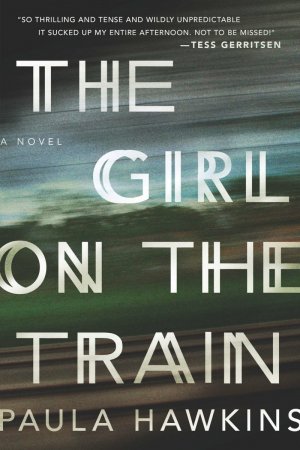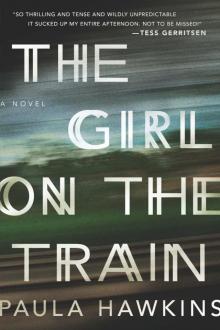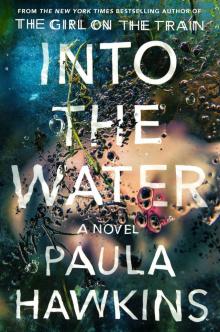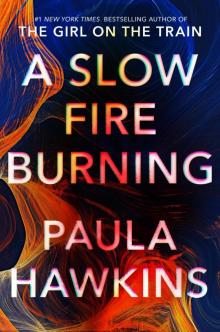- Home
- Paula Hawkins
The Girl on the Train Page 20
The Girl on the Train Read online
Page 20
I motion for him to sit down on the bed. He obeys, wiping his eyes with the back of his hand. He breathes out heavily.
“Can I get you something?” I ask him.
“A beer?”
“I don’t keep alcohol in the house,” I say, and I can feel myself going red as I say it. Scott doesn’t notice, though, he doesn’t even look up. “I can make you a cup of tea?” He nods again. “Lie down,” I say. “Rest.” He does as he’s told, kicking off his shoes and lying back on the bed, docile as a sick child.
Downstairs, while I boil the kettle I make small talk with Cathy, listening to her going on about the new place in Northcote she’s discovered for lunch (“really good salads”) and how annoying the new woman at work is. I smile and nod, but I’m only half hearing her. My body is braced: I’m listening out for him, for creaks or footsteps. It feels unreal to have him here, in my bed, upstairs. It makes me dizzy to think about it, as though I’m dreaming.
Cathy stops talking eventually and looks at me, her brow furrowed. “Are you all right?” she asks. “You look . . . kind of out of it.”
“I’m just a bit tired,” I tell her. “I’m not feeling very well. I think I’ll go to bed.”
She gives me a look. She knows I’ve not been drinking (she can always tell), but she probably assumes I’m about to start. I don’t care, I can’t think about it now; I pick up the cup of tea for Scott and tell her I’ll see her in the morning.
I stop outside my bedroom door and listen. It’s quiet. Carefully, I twist the doorknob and push the door open. He’s lying there, in exactly the same position I left him, his hands at his sides, his eyes shut. I can hear his breathing, soft and ragged. His bulk takes up half the bed, but I’m tempted to lie down in the space next to him, to put my arm across his chest, to comfort him. Instead, I give a little cough and hold out the cup of tea.
He sits up. “Thank you,” he says gruffly, taking the mug from me. “Thank you for . . . giving me sanctuary. It’s been . . . I can’t describe how it’s been, since that story came out.”
“The one about what happened years ago?”
“Yeah, that one.”
How the tabloids got hold of that story is hotly disputed. The speculation has been rife, fingers pointed at the police, at Kamal Abdic, at Scott.
“It’s a lie,” I say to him. “Isn’t it?”
“Of course it is, but it gives someone a motive, doesn’t it? That’s what they’re saying: Megan killed her baby, which would give someone—the father of the child, presumably—a motive to kill her. Years and years later.”
“It’s ridiculous.”
“But you know what everyone’s saying. That I made this story up, not just to make her look like a bad person, but to shift suspicion away from me, onto some unknown person. Some guy from her past that no one even knows about.”
I sit down next to him on the bed. Our thighs almost touch.
“What are the police saying about it?”
He shrugs. “Nothing really. They asked me what I knew about it. Did I know she’d had a child before? Did I know what happened? Did I know who the father was? I said no, it was all bullshit, she’d never been pregnant . . .” His voice catches again. He stops, takes a sip of the tea. “I asked them where the story came from, how it made it into the newspapers. They said they couldn’t tell me. It’s from him, I assume. Abdic.” He gives a long, shuddering sigh. “I don’t understand why. I don’t understand why he would say things like that about her. I don’t know what he’s trying to do. He’s obviously fucking disturbed.”
I think of the man I met the other day: the calm demeanour, the soft voice, the warmth in the eyes. As far from disturbed as it’s possible to get. That smile, though. “It’s outrageous that this has been printed. There should be rules . . .”
“Can’t libel the dead,” he says. He falls silent for a moment, then says, “They’ve assured me that they won’t release the information about this . . . about her pregnancy. Not yet. Perhaps not at all. But certainly not until they know for sure.”
“Until they know?”
“It’s not Abdic’s child,” he says.
“They’ve done DNA testing?”
He shakes his head. “No, I just know. I can’t say how, but I know. The baby is—was—mine.”
“If he thought it was his baby, it gives him a motive, doesn’t it?” He wouldn’t be the first man to get rid of an unwanted child by getting rid of its mother—although I don’t say that out loud. And—I don’t say this, either—it gives Scott a motive, too. If he thought his wife was pregnant with another man’s child . . . only he can’t have done. His shock, his distress—it has to be real. No one is that good an actor.
Scott doesn’t appear to be listening any longer. His eyes, fixed on the back of the bedroom door, are glazed over, and he seems to be sinking into the bed as though into quicksand.
“You should stay here a while,” I say to him. “Try to sleep.”
He looks at me then, and he almost smiles. “You don’t mind?” he asks. “It would be . . . I would be grateful. I find it hard to sleep at home. It’s not just the people outside, the sense of people trying to get to me. It’s not just that. It’s her. She’s everywhere, I can’t stop seeing her. I go down the stairs and I don’t look, I force myself not to look, but when I’m past the window, I have to go back and check that she’s not out there, on the terrace.” I can feel the tears pricking my eyes as he tells me. “She liked to sit out there, you see—on this little terrace we’ve got. She liked to sit out there and watch the trains.”
“I know,” I say, putting my hand on his arm. “I used to see her there sometimes.”
“I keep hearing her voice,” he says. “I keep hearing her calling me. I lie in bed and I can hear her calling me from outside. I keep thinking she’s out there.” He’s trembling.
“Lie down,” I say, taking the mug from his hand. “Rest.”
When I’m sure that he’s fallen asleep, I lie down at his back, my face inches from his shoulder blade. I close my eyes and listen to my heart beating, the throb of blood in my neck. I inhale the sad, stale scent of him.
When I wake, hours later, he’s gone.
THURSDAY, AUGUST 8, 2013
MORNING
I feel treacherous. He left me just hours ago, and here I am, on my way to see Kamal, to meet once again the man he believes killed his wife. His child. I feel sick. I wonder whether I should have told him my plan, explained that I’m doing all this for him. Only I’m not sure that I am doing it just for him, and I don’t really have a plan.
I will give something of myself. That’s my plan for today. I will talk about something real. I will talk about wanting a child. I’ll see whether that provokes something—an unnatural response, any kind of reaction. I’ll see where that gets me.
It gets me nowhere.
He starts out by asking me how I’m feeling, when I last had a drink.
“Sunday,” I tell him.
“Good. That’s good.” He folds his hands in his lap. “You look well.” He smiles, and I don’t see the killer. I’m wondering now what I saw the other day. Did I imagine it?
“You asked me, last time, about how the drinking started.” He nods. “I became depressed,” I say. “We were trying . . . I was trying to get pregnant. I couldn’t, and I became depressed. That’s when it started.”
In no time at all, I find myself crying again. It’s impossible to resist the kindness of strangers. Someone who looks at you, who doesn’t know you, who tells you it’s OK, whatever you did, whatever you’ve done: you suffered, you hurt, you deserve forgiveness. I confide in him and I forget, once again, what I’m doing here. I don’t watch his face for a reaction, I don’t study his eyes for some sign of guilt or suspicion. I let him comfort me.
He is kind, rational. He talks about coping strategies, he reminds
me that youth is on my side.
So maybe it doesn’t get me nowhere, because I leave Kamal Abdic’s office feeling lighter, more hopeful. He has helped me. I sit on the train and I try to conjure up the killer I saw, but I can’t see him any longer. I am struggling to see him as a man capable of beating a woman, of crushing her skull.
A terrible, shameful image comes to me: Kamal with his delicate hands, his reassuring manner, his sibilant speech, contrasted with Scott, huge and powerful, wild, desperate. I have to remind myself that this is Scott now, not as he was. I have to keep reminding myself of what he was before all this. And then I have to admit that I don’t know what Scott was before all this.
FRIDAY, AUGUST 9, 2013
EVENING
The train stops at the signal. I take a sip from the cold can of gin and tonic and look up at his house, her terrace. I was doing so well, but I need this. Dutch courage. I’m on my way to see Scott, and I’ll have to run all the risks of Blenheim Road before I do: Tom, Anna, police, press. The underpass, with its half memories of terror and blood. But he asked me to come, and I couldn’t refuse him.
They found the little girl last night. What was left of her. Buried in the grounds of a farmhouse near the East Anglian coast, just where someone had told them to look. It was in the papers this morning:
Police have opened an investigation into the death of a child after they found human remains buried in the garden of a house near Holkham, north Norfolk. The discovery came after police were tipped off about a possible unlawful killing during the course of their investigation into the death of Megan Hipwell, from Witney, whose body was found in Corly Woods last week.
I phoned Scott this morning when I saw the news. He didn’t answer, so I left a message, telling him I was sorry. He called back this afternoon.
“Are you all right?” I asked him.
“Not really.” His voice was thick with drink.
“I’m so sorry . . . do you need anything?”
“I need someone who isn’t going to say ‘I told you so.’”
“I’m sorry?”
“My mother’s been here all afternoon. She knew all along, apparently—‘something not right about that girl, something off, no family, no friends, came from nowhere.’ Wonder why she never told me.” The sound of glass breaking, swearing.
“Are you all right?” I said again.
“Can you come here?” he asked.
“To the house?”
“Yes.
“I . . . the police, journalists . . . I’m not sure . . .”
“Please. I just want some company. Someone who knew Megs, who liked her. Someone who doesn’t believe all this . . .”
He was drunk and I knew it and I said yes anyway.
Now, sitting on the train, I’m drinking, too, and I’m thinking about what he said. Someone who knew Megs, who liked her. I didn’t know her, and I’m not sure that I like her anymore. I finish my drink as quickly as I can and open another one.
I get off at Witney. I’m part of the Friday-evening commuter throng, just another wage slave amongst the hot, tired masses, looking forward to getting home and sitting outside with a cold beer, dinner with the kids, an early night. It might just be the gin, but it feels indescribably good to be swept along with the crowd, everyone phone-checking, fishing in pockets for rail passes. I’m taken back, way back to the first summer we lived on Blenheim Road, when I used to rush home from work every night, desperate to get down the steps and out of the station, half running down the street. Tom would be working from home and I’d barely be through the door before he was taking my clothes off. I find myself smiling about it even now, the anticipation of it: heat rising to my cheeks as I skipped down the road, biting my lip to stop myself from grinning, my breath quickening, thinking of him and knowing he’d be counting the minutes until I got home, too.
My head is so full of those days that I forget to worry about Tom and Anna, the police and the photographers, and before I know it I’m at Scott’s door, ringing the doorbell, and the door is opening and I’m feeling excited, although I shouldn’t be, but I don’t feel guilty about it, because Megan isn’t what I thought she was anyway. She wasn’t that beautiful, carefree girl out on the terrace. She wasn’t a loving wife. She wasn’t even a good person. She was a liar, a cheat.
She was a killer.
MEGAN
• • •
THURSDAY, JUNE 20, 2013
EVENING
I’m sitting on the sofa in his living room, a glass of wine in my hand. The house is still a total mess. I wonder, does he always live like this, like a teenage boy? And I think about how he lost his family when he was a teenager, so maybe he does. I feel sad for him. He comes in from the kitchen and sits at my side, comfortably close. If I could, I would come here every day, just for an hour or two. I’d just sit here and drink wine, feel his hand brush against mine.
But I can’t. There’s a point to this, and he wants me to get to it.
“OK, Megan,” he says. “Do you feel ready now? To finish what you were telling me before?”
I lean back a little against him, against his warm body. He lets me. I close my eyes, and it doesn’t take me long to get back there, back to the bathroom. It’s weird, because I’ve spent so long trying not to think about it, about those days, those nights, but now I can close my eyes and it’s almost instant, like falling asleep, right into the middle of a dream.
It was dark and very cold. I wasn’t in the bath any longer. “I don’t know exactly what happened. I remember waking up, I remember knowing that something was wrong, and then the next thing I know Mac was home. He was calling for me. I could hear him downstairs, shouting my name, but I couldn’t move. I was sitting on the floor in the bathroom, she was in my arms. The rain was hammering down, the beams in the roof creaking. I was so cold. Mac came up the stairs, still calling out to me. He came to the doorway and turned on the light.” I can feel it now, the light searing my retinas, everything stark and white, horrifying.
“I remember screaming at him to turn the light off. I didn’t want to see, I didn’t want to look at her like that. I don’t know—I don’t know what happened then. He was shouting at me, he was screaming in my face. I gave her to him and ran. I ran out of the house into the rain, I ran to the beach. I don’t remember what happened after that. It was a long time before he came for me. It was still raining. I was in the dunes, I think. I thought about going in the water, but I was too scared. He came for me eventually. He took me home.
“We buried her in the morning. I wrapped her in a sheet and Mac dug the grave. We put her down at the edge of the property, near the disused railway line. We put stones on top to mark it. We didn’t talk about it, we didn’t talk about anything, we didn’t look at each other. That night, Mac went out. He said he had to meet someone. I thought maybe he was going to go to the police. I didn’t know what to do. I just waited for him, for someone to come. He didn’t come back. He never came back.”
I’m sitting in Kamal’s warm living room, his warm body at my side, and I’m shivering. “I can still feel it,” I tell him. “At night, I can still feel it. It’s the thing I dread, the thing that keeps me awake: the feeling of being alone in that house. I was so frightened—too frightened to go to sleep. I’d just walk around those dark rooms and I’d hear her crying, I’d smell her skin. I saw things. I’d wake in the night and be sure that there was someone else—something else—in the house with me. I thought I was going mad. I thought I was going to die. I thought that maybe I would just stay there, and that one day someone would find me. At least that way I wouldn’t have left her.”
I sniff, leaning forward to take a Kleenex from the box on the table. Kamal’s hand runs down my spine to my lower back and rests there.
“But in the end I didn’t have the courage to stay. I think I waited about ten days, and then there was nothing left to eat�
�not a tin of beans, nothing. I packed up my things and I left.”
“Did you see Mac again?”
“No, never. The last time I saw him was that night. He didn’t kiss me or even say good-bye properly. He just said he had to go out for a bit.” I shrug. “That was it.”
“Did you try to contact him?”
I shook my head. “No. I was too frightened, at first. I didn’t know what he would do if I did get in touch. And I didn’t know where he was—he didn’t even have a mobile phone. I lost touch with the people who knew him. His friends were all kind of nomadic. Hippies, travellers. A few months ago, after we talked about him, I Googled him. But I couldn’t find him. It’s odd . . .”
“What is?”
“In the early days, I used to see him all the time. Like, in the street, or I’d see a man in a bar and be so sure it was him that my heart would start racing. I used to hear his voice in crowds. But that stopped, a long time ago. Now, I think he might be dead.”
“Why do you think that?”
“I don’t know. He just . . . he feels dead to me.”
Kamal sits up straighter and gently moves his body away from mine. He turns so that he’s facing me.
“I think that’s probably just your imagination, Megan. It’s normal to think you see people who have been a big part of your life after you part company with them. In the early days, I used to catch glimpses of my brother all the time. As for him ‘feeling dead,’ that’s probably just a consequence of his being gone from your life for so long. In some senses he no longer feels real to you.”
He’s gone back into therapy mode now, we’re not just two friends sitting on the sofa anymore. I want to reach out and pull him back to me, but I don’t want to cross any lines. I think about last time, when I kissed him before I left—the look on his face, longing and frustration and anger.

 Girl on the Train
Girl on the Train The Girl on the Train
The Girl on the Train Into the Water
Into the Water A Slow Fire Burning
A Slow Fire Burning